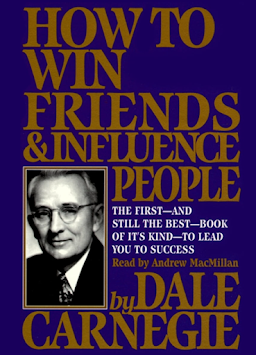Book Report and Critique on How to Win Friend and Influence People by Dale Carnegie (2009)
Dale Carnegie's "How to Win Friends and Influence People" is a classic guide to improving social skills and increasing one's impact in various areas of life. First published in 1936, the book continues to be popular worldwide for its practical advice and actionable tips. Its enduring relevance highlights the universal appeal of its principles, which offer valuable insights for navigating social interactions and achieving personal goals. Widely regarded as a must read for anyone looking to enhance their interpersonal effectiveness, Carnegie's work remains a go-to resource for individuals seeking to build stronger relationships and exert positive influence in their lives.
At its core, Carnegie's book revolves around the fundamental principle of understanding and empathizing with others. He emphasizes the importance of genuine interest in people, arguing that sincere appreciation and recognition of their value are key to building strong, lasting relationships. By acknowledging individuals' perspectives and affirming their worth, Carnegie demonstrates how to cultivate goodwill and earn others' trust.
One of the most important concepts in the book is Carnegie's emphasis on the power of empathy and active listening. He encourages readers to focus on understanding others' viewpoints rather than solely expressing their own opinions. By demonstrating genuine interest in people's concerns and experiences, Carnegie illustrates how to establish rapport and foster meaningful connections. Through anecdotes and practical examples, he highlights the transformative impact of empathetic communication in building mutually beneficial relationships.
Another crucial concept addressed by Carnegie is the art of persuasion. He explores strategies for influencing others' behavior and attitudes without resorting to coercion or manipulation. Carnegie advocates for a collaborative approach to persuasion, emphasizing the importance of finding common ground and appealing to people's interests and values. By framing messages in a way that resonates with others' desires and aspirations, he demonstrates how to gain their cooperation and support.
Moreover, Carnegie emphasizes the significance of humility and openness to criticism in personal and professional development. He encourages readers to embrace feedback as an opportunity for growth rather than a threat to their ego. By demonstrating receptiveness to others' perspectives and acknowledging their insights, Carnegie illustrates how to cultivate trust and credibility, thereby enhancing one's influence and effectiveness as a communicator.
Additionally, Carnegie delves into the importance of remembering people's names and acknowledging their achievements. He highlights the impact of personalized recognition in making individuals feel valued and appreciated. By demonstrating attentiveness and sincerity in interactions, Carnegie shows how to strengthen connections and foster goodwill.
Furthermore, Carnegie discusses the role of genuine interest in others' interests and concerns. He emphasizes the importance of asking questions and actively engaging with people's experiences. By demonstrating curiosity and empathy, Carnegie illustrates how to deepen relationships and build trust.
In conclusion, "How to Win Friends and Influence People" offers a wealth of timeless wisdom for navigating social interactions and enhancing one's influence. Through practical strategies and relatable anecdotes, Carnegie provides readers with invaluable insights into the dynamics of human relationships. By emphasizing the importance of empathy, humility, and genuine interest in others, Carnegie offers a roadmap for success in both personal and professional spheres. This book serves as a reminder of the transformative power of authentic connections and meaningful communication in achieving one's goals and aspirations.
Critique
“How to Win Friends and Influence People” by Dale Carnegie is undeniably impactful in its approach to interpersonal relationships and personal influence. Carnegie's use of relatable anecdotes and practical advice makes the book engaging and accessible to readers of all backgrounds. From the very beginning, the book captures attention and maintains interest, drawing readers in with its insightful storytelling.
On a scale of 1 to 10, I would rate this book a solid 9/10. While its organization could be slightly improved, the wealth of valuable content more than compensates for any minor shortcomings. Carnegie's exploration of human behavior and communication techniques is both enlightening and thought-provoking, offering readers valuable insights into the dynamics of social interaction.
One particularly compelling aspect of the book is its emphasis on the importance of empathy and genuine interest in others. By highlighting the significance of understanding and affirming individuals' perspectives, Carnegie demonstrates how to cultivate trust and build meaningful connections.
Moreover, this book provides practical strategies for enhancing one's influence and effectiveness in various aspects of life. Whether in personal relationships or professional endeavors, Carnegie's principles offer actionable guidance for achieving success and fostering positive relationships.
Overall, reading this book has been a truly enriching experience. It has provided me with valuable tools and perspectives that I can apply to my own life, both as a student and as a future professional. I highly recommend this book to anyone seeking to improve their interpersonal skills and maximize their impact on others.





Comments
Post a Comment